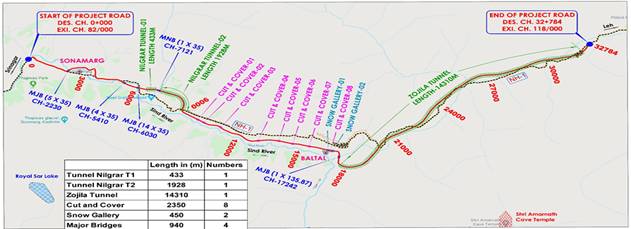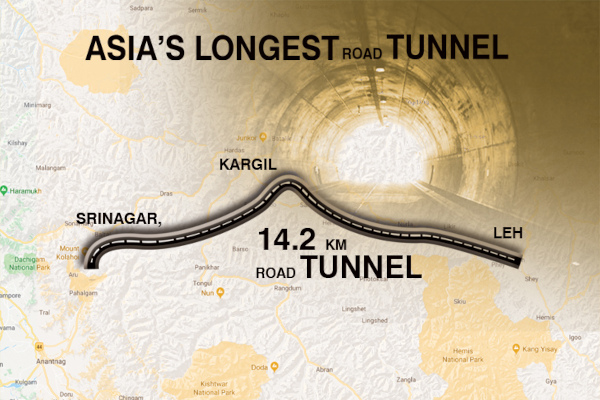Work on the Zozila Tunnel in J&K began today with ceremonial blasting. The tunnel will provide all-weather connectivity between Srinagar valley and Leh (Ladakh plateau) on NH-1, and will bring about an all-round economic and socio–cultural integration of Jammu & Kashmir (Now UTs of J&K and Ladakh). It involves construction of a 14.15 Km long tunnel at an altitude of about 3000 m under Zojila pass (presently motorable only for 6 months in a year) on NH-1 connecting Srinagar and Leh through Dras & Kargil. It is one of the most dangerous stretch in the world to drive a vehicle & this project is also geo-strategically sensitive.
The project was first conceived in 2005 and its Detailed Project Report (DPR) was prepared by BRO in year 2013 on BOT (Annuity) mode. Attempts to award the project four times weren’t successful. The Project was eventually given to NHIDCL in July 2016 for implementation on EPC mode. Its work was awarded to M/s. ITNL (IL&FS). Prime Minister Shri Narendra Modi laid foundation stone at Leh and commenced the work on 19.5.2018. The work progressed up to July 2019, and thereafter M/s. IL&FS went into financial problems and the project was stuck. Hence, the contract was terminated on 15.01.2019.
Thereafter, in February 2020, Shri Nitin Gadkari, Minister for Road transport & Highways, reviewed this whole project in detail. In order to reduce the cost and to execute the languishing project on priority, referred the matter to an expert group under the Chairmanship of Shri I.K Pandey, DG (RD) & SS, MoRTH. The Expert group suggested modalities of project configuration and implementation, to achieve project completion in least possible time and cost.
After due consultation with tunnel experts and other stakeholders, the expert group submitted its report on 17.5.2020, which was approved by the Minister, RTH on 23.05.2020. The salient features of the report include the following:
- Construction of two-lane Bi-directional single tube tunnel without parallel egress/escape passage.
- Reduction in construction shafts from 3 to 2.
- The Design Speed in tunnel to be 80 KMPH.
- Adding approach road of 18 km (Net road length is 12 KM) from end of Z-Morh tunnel to start of Zozila tunnel with Avalanche protection structures such as Catch Dams, Snow Galleries, Cut & Cover, Deflector Dam, etc. to make it an all-weather connection between two tunnels.
- The modified cost worked out was Rs. 4429.83 crore & it would reduce the travel time from more than 3.5 Hours currently to just 15 Minutes to travel through the tunnel.
- To take up integrated project of Zozila tunnel and approach road from Z-Morh to Zozila with avalanche protection for all weather connectivity.
Modified configuration of project:
| Sr. No. | Salient Features | ||
| Length | Zojila Tunnel length = 14.15 Km and Approach road length = 18.63 Km. Total project length is 32.78 km. | ||
| Scope of Work | 14.150 km long Bi-directional tunnel without Egress/escape passage between Baltal and Minamarg. 18.63 Km approach road between Z-Morh tunnel and Zojila tunnels including two tunnels of length 433m and 1958m in approach road.Net Road length is 12 KMs. Road safety & avalanche protection structures such as Catch Dams, Snow Galleries, Cut & Cover, Deflector Dam etc. | ||
| Construction Period | Zozila Tunnel = 6 Years | Approach road = 2.5 Years |
Map showing the alignment:

Consequent to approval, NHIDCL invited the bids on 10.6.2020. Consequent upon Technical qualification of all three bidders, financial bids were opened on 21.8.2020 and M/s. Megha Engineering & Infrastructure Limited was awarded the work for its quoted rate of Rs 4509.50 crore, and the Letter of Acceptance (LOA) was issued on 25.08.2020.
The capital cost of approach road from Zozila Tunnel to Z-Morh tunnel (18.63 Km) to make the road all weather was worked out to be Rs.2335 Crores as per the DPR. The construction cost of Zozila tunnel was worked out at Rs. 6575.85 Crores after considering the escalation @ 5% per annum and the total capital cost of the project as Rs.8308 Crs by NHIDCL. Thus the total integrated cost of the project including Zozila tunnel and approaches upto Z- Morh tunnel works out to Rs.10643 Crores. Now comparing to the present cost of the integrated project, based on the tender received at Rs. 4509.5 Crs, the total capital cost of the project would be Rs. 6808.63. Thus, after re-modelling of the project and reaping the benefit of integrated project management by segregating the egress tunnel & utilizing the excavated rock material in construction of approaches, generated from tunnel boring, resulted in an anticipated saving of Rs. 3835 crore besides resolving the issue of muck disposal to a great extent.
Significance of the project:
(i) The construction of Zojila Tunnel will provide all-weather safe connectivity between Srinagar, Dras, Kargil and Leh regions. The all-weather safe connectivity of the road is immensely important from the strategic point of view.
(ii) The construction of Zozila Tunnel shall bring about all round economic and socio-cultural integration of these regions which remains cut-off from rest of the country during winters due to heavy snowfall for about six months.
(iii) A tunnel in Zozila is the only viable alternative at present for a full year connectivity road. This tunnel when completed will be a landmark achievement in the history of modern India. It will also be of great importance to the Defence of the country, in view of the fact that massive military activities along our borders in Ladakh, Gilgit and Baltistan regions are taking place.
(iv) Zozila Tunnel project shall bring to fruition, 30 years of overwhelming public demand of Kargil, Drass and Ladakh region.
(v) This Project will make the travel on Srinagar-Kargil-Leh Section of NH-1 free from avalanches.
(vi) Project would enhance the safety of the travelers crossing Zozila Pass and would reduce the Travel time from more than 3 hours to 15 minutes.
(vii) Project will generate employment to the locals.
Safety features of Zozilla Tunnel:
- Emergency lay-bys are located at intervals of 750 m staggered on both sides of the carriageway. There are sidewalks on both sides of the carriageway. Emergency call niches and hydrant niches are situated at intervals of 125 m.
- Manual fire alarm push buttons and portable fire extinguishers shall be at the disposal of all drivers.
3. A telephone shall be installed at the emergency call niches.
4. Fire Hydrants and Hydrant Niches, Fire Extinguishers.
5. Tunnel Lighting Systems: The Tunnel Lighting System represents the most significant part of the tunnel traffic safety and shall cover the following needs:
- Entrance lighting (in the accommodation sections at both ends of the tunnel)
- Interior lighting (through the whole tunnel)
- Lay-bys lighting
6. Video Surveillance system.
- CCTV-Cameras: The surveillance cameras in the tunnel shall be installed on the tunnel wall and the cameras in the area before and after the tunnel are installed on a pole. Data and video mage shall be transmitted through the communications lines. To achieve this, transceivers and media converter shall be employed.
7. Fire Alarm System in buildings
8. Automatic Fire Detection and suppression System in the tunnel
Linear heat detection systems shall be connected the SCADA system through its own control system.
9. Emergency Telephone Niches
Emergency call niches shall be located, according to the EU standard, in the tunnel at intervals of less than 125 m each to other in the tunnel and in all lay-bys. The emergency points shall have the following equipment:
- Fire alarm push buttons
- Fire extinguishers
10. Traffic control system with a central control room.
Source:PIB
You may also like
-
IAF Aircraft Set Course For Exercise Eastern Bridge VII At Oman
-
IAF Set To Host The Indian Defence Aviation Exposition-II At Jodhpur
-
Dot Simplifies Approval Processes For Telecom Licenses And Wireless Equipment
-
Defence Secretary to co-chair 5th India-Philippines Joint Defence Cooperation Committee meeting in Manila
-
Simultaneous Launch Of ‘malpe And Mulki’, Fourth And Fifth Ships Of Asw Swc (Csl) Project
